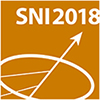Speaker
Description
Computational materials design based on first-principle calculations holds a huge potential in identifying novel compounds with superior functional properties. To model thermal conductivity, the progress made with ab initio methods to date allows to calculate wavevector-dependent relaxation rates for every phonon mode in the Brillouin zone. Despite the tempting opportunities offered by computational methods it is mandatory to validate the underlying theoretical models which are often based on approximations to tackle the many-body problem. Experimental data on phonon lifetimes allows to test the predictive power of numerical calculations.
We have used inelastic neutron scattering to measure phonon lifetimes in the perovskite model system SrTiO$_3$. While triple-axis spectroscopy conducted at V2/FLEXX, BER II, HZB, convincingly demonstrates the anisotropy of phonon lifetimes, neutron resonance spin-echo spectroscopy performed at TRISP, FRM II, MLZ, allows to pin-point the phonon lifetimes on an absolute scale. Our experiments reveal a significant temperature dependence of lifetimes for transverse acoustic phonons. Brillouin zone boundary phonons show a pronounced increase in energy width below the antiferrodistortive phase transition at T$_C$=105 K. Larmor diffraction measurements allow us to relate the reduced phonon lifetimes to additional phonon scattering at the domain walls.

